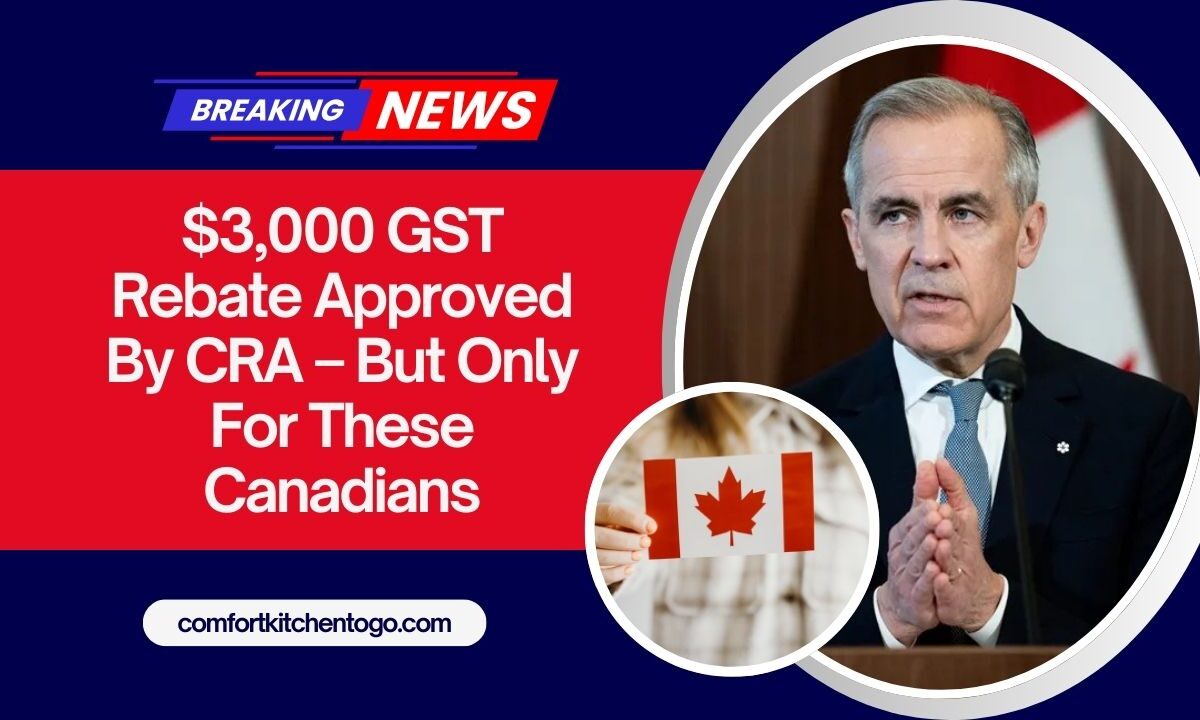In response to growing inflation and the rising cost of living, the Canada Revenue Agency (CRA) has launched a $3,000 GST rebate initiative to support struggling Canadians.
While not everyone qualifies, this one-time rebate is part of Canada’s strategy to deliver direct financial relief to low and middle-income individuals and families.
This article breaks down who qualifies, how to claim, payment dates, and key eligibility conditions.
What Is the $3,000 CRA GST Rebate?
The $3,000 GST rebate is a one-time payment introduced by the CRA to offset the burden of Goods and Services Tax (GST) paid by Canadians amid financial strain.
This initiative is separate from the regular GST/HST credit and is intended to provide targeted economic relief to those who need it the most.
It is being issued in $250 quarterly payments, amounting to $1,000 annually per person or up to $3,000 per household depending on family size and qualifying criteria.
Who Is Eligible for the One-Time GST Rebate?
To qualify for this GST relief payment, the following eligibility conditions must be met:
| Eligibility Criteria | Details |
|---|---|
| Age Requirement | Must be 19 years or older as of the payment date |
| Residency | Must be a Canadian resident with legal status (citizen, PR, valid visa) |
| Income Threshold | Targeted at low to middle-income individuals/families |
| Tax Return Filing | Must have filed the most recent tax return |
| Household Status | Can be single or have a spouse/common-law partner |
| Dependents | Children under 19 must be listed on your GST/HST credit claim |
In addition, the CRA assesses total household income, and the payment amount may be reduced or phased out for higher income earners.
How Much Will You Get?
The payment amount depends on the number of eligible adults and children in your household. Here’s a basic breakdown:
| Family Type | Estimated Annual Rebate |
|---|---|
| Single individual | $1,000 |
| Couple without children | $2,000 |
| Couple with 2 children | $3,000 |
CRA GST Credit Payment Dates – 2025 Schedule
Canadians eligible for the GST/HST Credit will receive payments quarterly throughout 2025. Here’s the expected schedule:
| Payment Period | Payment Date |
|---|---|
| Q1 | July 4, 2025 |
| Q2 | October 2025 |
| Q3 | January 2026 |
Payments will be deposited directly to your registered bank account or sent via paper cheque depending on your CRA profile preferences.
How to Claim the $250 One-Time GST Relief Payment?
If you’re already receiving the regular GST/HST credit, you don’t need to take any additional steps. The CRA will automatically deposit the one-time payment if you meet the criteria.
Here’s a quick guide:
- No Application Needed: No separate application form is required.
- Automatic Payment: If eligible, you’ll receive the payment directly into your bank account.
- Filing Taxes Is Mandatory: Ensure you file your latest tax return so CRA can determine your eligibility.
- Troubleshooting: If you don’t receive your payment despite being eligible, contact CRA for resolution.
Why This Rebate Matters
With food, rent, and utilities seeing record price hikes, this $3,000 GST rebate helps Canadians stay financially afloat. This effort also bridges the gap for people who might not qualify for other support like Child Benefit or Employment Insurance, but still need economic relief due to inflation.
It is part of the federal government’s broader plan to protect vulnerable households and strengthen economic resilience in the face of global instability.
The CRA’s $3,000 GST rebate comes as a welcome relief to millions of Canadians battling increased living costs. If you’re a low to middle-income earner, make sure you’ve filed your taxes and check your CRA My Account for deposit updates.
With automatic quarterly deposits beginning July 4, 2025, this rebate can play a significant role in your household’s financial stability.
FAQs
Do I need to apply separately for the $3,000 GST rebate?
No, if you already receive GST/HST credits and meet eligibility, the rebate will be automatically deposited.
Can I receive the full $3,000 if I have dependents?
Yes, households with multiple dependents may receive up to $3,000 annually, depending on family size and income.
What should I do if I didn’t receive the payment on the expected date?
First, check your CRA My Account and bank records. If still unresolved, contact CRA for assistance.

